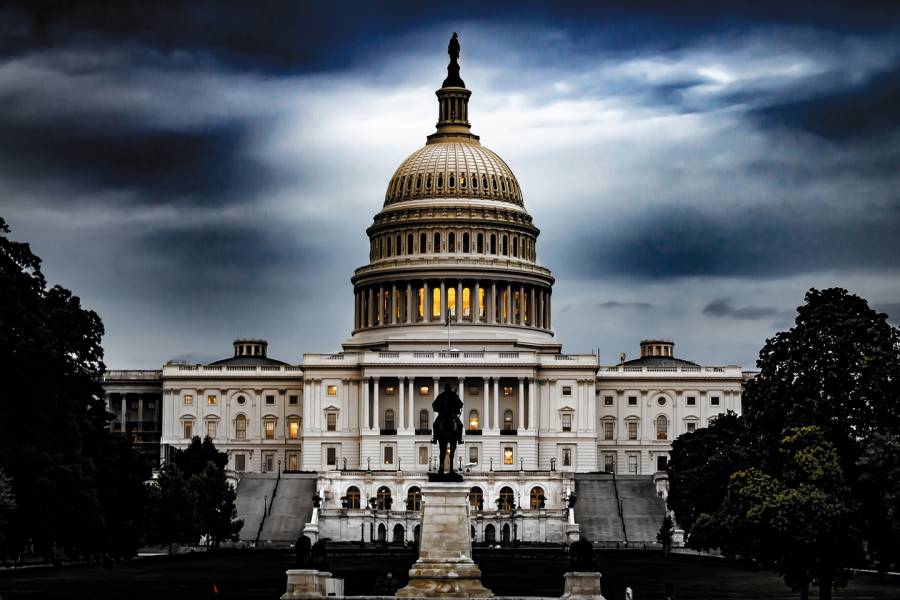Eliot Cohen says there's a great deal to learn about political theater from an enduring master of the stage: William Shakespeare.
Before Cohen was appointed dean of the Johns Hopkins School of Advanced International Studies over the summer, he regularly taught classes at SAIS on what the Bard's work reveals about politics. He delivered a lecture on the topic in late September as part of the SAIS 75th anniversary celebrations.
The day before that talk, a scene of Shakespearean proportion played out on the national stage: House Speaker Nancy Pelosi announced that the U.S. House of Representatives would initiate a formal impeachment inquiry against President Donald Trump. Though Cohen didn't discuss the impeachment proceedings during the lecture, the announcement loomed over the evening, as if lurking just offstage.
Cohen's talk got us thinking about the current state of play in U.S. politics. As Congress returns from a recent two-week recess to face an ongoing impeachment inquiry and pressing foreign policy concerns in Syria, what insights could the Bard's writings reveal about the cast of characters who lead the nation's government? What does Cohen, a prominent political scientist and former counselor to Secretary of State Condoleezza Rice, see when he reads the headlines? What does he think the famous playwright would make of D.C.'s drama?
From our conversation, one thing remains clear: Something is rotten in the state of American politics.
What can Shakespeare's plays teach us about our political leaders?
I think Shakespeare teaches us about the role of character in politics. Fundamentally, Shakespeare is exploring different kinds of characters, and they are timeless. And he does it with a kind of depth and eloquence that nobody has ever matched.
Do you recognize any of Shakespeare's characters on the American political stage now?
Oh certainly, though not always the ones you might think of.
So not necessarily King Lear ...
Well, very few politicians have that depth. They're more like some of the minor characters. As I mentioned in my talk, one of my favorite plays is Cymbeline, and there's a character in it named Cloten, who unfortunately I think resembles some of our current politicians.
Rather, the phenomena in Shakespeare's plays are universal. Take Richard III, for example, who is a tyrannical genius. One of the things I find interesting about him is that he is a warped character in many respects—he can be extremely clever and self-aware as he strives for power. But once he's actually achieved power, he stops being as shrewd and insightful—and indeed as funny—as he is in the first half of the play.
You see something similar in Macbeth. I mean, Macbeth is a great study in the deterioration of character. When we first encounter Macbeth, he's not an evil guy, but he ends up committing many murders. By the end of the play, he's in a state of existential despair because he's self-aware enough to know what has happened to him. When you talk about people in politics, as with Shakespeare's characters, we see that people change, and often not for the better.
But I think one danger with Shakespeare is that his villains are so, if I can use the word, majestic. I mean, Richard III or Macbeth—these are villains on an epic scale. I don't think we have villains on that scale in our time. But in political life, it's very easy to paint your adversary as something much grander than they are. Part of the genius of Shakespeare is that he was as wonderful in his depiction of people who are altogether of human stature as he was in describing the ones who are the epitome of villainy.
Is there a passage from Shakespeare that you think sums up what's going on in our political sphere right now?
That's easy—Act 2, Scene 1 of Richard II. It's one of the greatest patriotic speeches of all time. John of Gaunt is on his deathbed, and he talks about England as a "precious stone set in the silver sea." It really is a beautiful speech, but it has a very dark conclusion, and the line which I think captures our predicament, unfortunately, is:
That England, that was wont to conquer others, Hath made a shameful conquest of itself.
I think that captures where we are. We've done this to ourselves. And it echoes for me another very famous passage from Abraham Lincoln's Lyceum Address in 1838:
Shall we expect some transatlantic military giant, to step the Ocean, and crush us at a blow? Never! All the armies of Europe, Asia, and Africa combined, with all the treasure of the earth (our own excepted) in their military chest; with a Buonaparte for a commander, could not by force, take a drink from the Ohio, or make a track on the Blue Ridge, in a trial of a thousand years.
At what point then is the approach of danger to be expected? I answer, if it ever reach us, it must spring up amongst us. It cannot come from abroad. If destruction be our lot, we must ourselves be its author and finisher.
"If destruction be our lot, we must ourselves be its author and finisher." I'd say that's pretty similar to what Shakespeare is saying through John of Gaunt. And Lincoln, by the way, adored Shakespeare. When he was still riding circuit as a lawyer, he would usually keep Shakespeare in his saddlebag.
The topic of Shakespeare and politics is the basis of a forthcoming book you're writing. What can you tell us about it?
I'm still in the process of writing it, but what the book will do is take a different approach from typical Shakespeare books, which tend to go play by play. Instead, it'll be about Shakespeare and the arc of power—how characters acquire it, how they exercise it, and how they relinquish it. You gain some interesting insights when you look at it that way.
For example, you can compare King Lear from the play of that name with Prospero from The Tempest, both of whom voluntarily give up their power—Lear at the beginning of the play, Prospero at the end—for very different reasons and with very different outcomes. So why is that the case? Why does it work for Prospero and not for Lear? I think that's a better way of wrestling with Shakespeare and I think it'll shake loose some creative comparisons.
How often are you able to see Shakespeare performed?
We're very fortunate, being in Washington, D.C., to have not one but two Shakespeare theaters. My wife and I have an annual subscription to the Folger, which I like because it's a pretty small stage and the staging tends to be traditional, but we also go to the Shakespeare Theatre Company, which is wonderful as well and puts on magnificent stagings. And, of course, when I travel, I try to catch something.
That's one of the great things about Shakespeare—he's everywhere. He's universal. And one just has to stop and marvel at it.
Posted in Voices+Opinion, Politics+Society
Tagged political science, eliot cohen, politics, q+a











